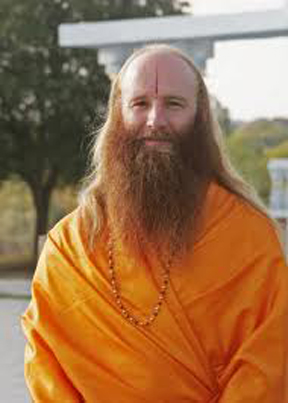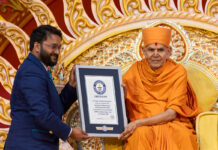 Swami Nikhilanand In the previous article of this series (There are consequences to every action that we perform), we learnt about the law of Karma, and how that is relevant in our lives. In this article, we will understand the secret of duty and attachment, which is also equally relevant.
Swami Nikhilanand In the previous article of this series (There are consequences to every action that we perform), we learnt about the law of Karma, and how that is relevant in our lives. In this article, we will understand the secret of duty and attachment, which is also equally relevant.
Chapter 1 of the Gita is mainly the poorv pakch or the part where Arjun puts all his questions and doubts in front of Krishna. In it, Arjun makes his confusion known to Krishna, Who then takes the next 17 chapters to clear Arjun’s doubts and answer all of his questions. In fact, Shree Krishna did not speak a word in the first chapter. He listened and allowed Arjun to express whatever was in his heart before He said anything. Krishna’s discourse – the uttar pakch or answer part of the Gita – did not begin until the second chapter.
Arjun’s Duty
In the first chapter, we see that Arjun is not sure what his duty – or dharm – is in this situation. His ability to reason is clouded by his attachment to those against whom he is going to fight. In fact, if he was not related to or attached to any of the warriors in the other army, his duty would have been very clear to him.
What was Arjun’s duty? In our modern terms, it can be compared to that of a police officer. The police officer has the duty to enforce the laws of the society. That means that he is supposed to protect those who follow the law, and prevent others from breaking the law. If someone does break the law, he is supposed to capture him and bring him to justice so he cannot keep doing it. If the one breaking the law refuses to obey the police officer and continues to break the law, then the officer may use force to stop him. If the criminal threatens the officer’s life or the life of another citizen, the police officer may be justified in using lethal force – although he will exhaust all other options first. The use of force by the police officer is the last option.
In just the same way, Arjun had a duty to uphold the laws of the society in which he lived. This was his physical dharm. Duryodhan was breaking those laws. In order to protect the laws and the citizens, Arjun had a duty to stop him. Arjun and the Pandavs were on the side of dharm, and Duryodhan and the Kauravs were on the side of adharm.
Before coming to the point of war, Arjun had exhausted all other options to resolve the situation; but Duryodhan would not compromise and demanded a war. So Arjun had only two options remaining: fight the war or allow Duryodhan to continue his evil ways unchecked. If a police officer finds himself in such a situation, then it is obvious what his duty is: he must use force to bring the criminal to justice.
Duty vs. Attachment
When Arjun’s duty is so clear cut, then why was he confused? The reason is clear – only because of his attachment. When he saw the people against whom he was going to fight, his heart melted, because many of them were part of his extended family or were his elders who had educated him as a boy. Because they were dear to him, he became confused about his duty.
Is it right to fight against his own family? Although this may seem like a confusing situation, from the point of view of dharm, it is still perfectly clear. Ask yourself: if a police officer sees someone from his own family breaking the law, is he supposed to take his relation to them into consideration, or is he supposed to enforce the law equally, regardless of his personal attachments?
The answer is obvious: he is required to enforce the law against a family member or loved one in the same way he would against a stranger. In fact, if he gives a family member or loved one any special consideration, he may be punished by his superiors or viewed as an accomplice in the crime.
Arjun’s situation highlights this conflict between duty and attachment, which is something every person faces on a daily basis. Every day we are met with situations where we have to weigh duty versus attachment. If your own son was breaking the law, would you call the police or would you try to cover it up? Duty says to call the police. Attachment says to cover it up.
It is for this very reason that Dhritrashtra was unable to do his duty as king. His attachment to his evil sons was so great that it made him helpless. Even though he knew what Duryodhan was doing was evil, he was powerless to stop him because he was unwilling to see his son getting punished. In the end, Dhritrashtra was as responsible for all of his son’s evil deeds as he was.
This is one of the central themes of the Gita, and is very relevant in our daily life. In the next article we will begin Chapter 2 and see how Shree Krishna began to resolve Arjun’s confusion.
Disciple of Shree Kripaluji Maharaj
Swami Nikhilanand Ji is a Canadian born Hindu spiritual leader based in Austin, Texas. He is a sanyasi disciple and pracharak of Jagadguru Shree Kripaluji Maharaj.
Attracted to the teachings of Hinduism from a young age, Swamiji eventually let his deep spiritual longing lead him to India, where he was most fortunate to come under the guidance of Shree Kripaluji Maharaj. Thereafter, living in the ashrams of JKP, he extensively studied Hindi, the philosophy of the prime Sanskrit scriptures (Vedas, Darshan Shastras, Gita, Bhagwatam), and practiced meditation in the tradition of raganuga bhakti. In 2003, he was given sanyas.
Now, with the blessings of his Guruji, he offers satsang programs throughout America, engaging audiences with his clear explanations of Hindu philosophy coupled with inspired chanting of Sanskrit mantras and shlokas and charming nam sankirtan. His informative and compelling speeches provide practical insight into how to adopt the teachings of Sanatan Dharm into our daily lives, and inspire us to awaken our inner spiritual potential.






